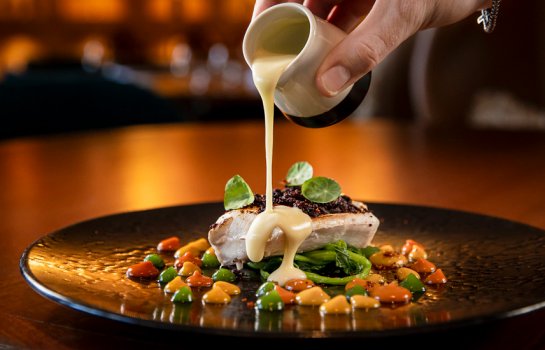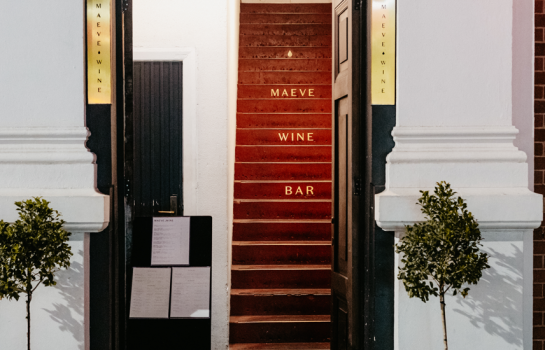Prue Henschke, viticulturalist, Henschke
Trust your intuition ...
Many of us can probably admit to mulling life over with a glass of wine in hand, perhaps a half-empty bottle on the table, and lofty dreams in our head. Some of these reveries might lead to the quiet life on a rolling vineyard, spending our days examining the trellises, studying the soil and enjoying the fruits of our labour in the evening. For viticulturalist Prue Henschke, this is reality. As a custodian of the sixth-generation family winery Henschke, alongside her winemaker husband Stephen and their three children, Prue has led vital research projects on native grasses, composts and insects, while also working towards sustainability by employing organic and biodynamic principles. Prue dropped in to Brisbane recently to celebrate the release of the Mount Edelstone 2012 60th Anniversary Shiraz, so The Weekend Edition took the opportunity to talk wine and family with the articulate oenophile.
You originally studied botany and zoology, what inspired the change of heart to viticulture?
I could have studied baboons or seaweed, but I chose to go to Germany with my now-husband Stephen. I enrolled as a ‘guest listener’ at Geisenheim doing mostly viticulture, and my previous studies provided a very handy background to the study of the vine. The German wine industry was the cutting edge of viticulture and winemaking at the time and we learnt so much, made some great life-long friends from around the world and also had the opportunity to explore different European regions.
What’s your personal favourite drink of choice?
Depending what I’m eating, it can be a zesty riesling, a luscious pinot gris, a supple pinot noir or an elegant shiraz, but I do make a great-tasting Singapore sling with real homemade cherry brandy from the traditional sauerkirschen (sour cherries) in the garden and fresh orange juice.
For those who haven’t had the pleasure of visiting the Henschke vineyard, please set the scene …
The vineyard sits at the base of the eastern slope under Mount Edelstone, which is a gentle hill enclosed by big red gum grassy woodlands, next to the original Angas pear and plum orchard in the Eden Valley wine region, just east of Angaston. The big gnarly shiraz vines were planted in 1912 down the slope quite wide apart and they’re now trained on a Scott Henry trellis, with shoots reaching up and down in a two-metre curtain, with a ribbon of dark blue-red, long-tailed bunches in the middle. The green mid-rows have a perennial grass sward and contrast with the golden straw mulch covering the compost layer under the vines. Around the vineyard are grazing paddocks belonging to the original Angas family, who are the descendants of the founding father of the Barossa, George Fife Angas.
You took on the role of viticulturist in 1987, how have you seen Australian tastes evolve over the years?
The change has been dramatic – from a simple choice of red or white, to particular varieties such as riesling then chardonnay, cabernet sauvignon and shiraz. Now unusual varieties from wine regions across the world are fascinating the wine consumer, with many nuances in flavour, structure and tannin – particularly nebbiolo and tempranillo.
What are the key tenets of your winemaking philosophy?
‘Exceptional wines from outstanding vineyards’ is the principal tenet of Henschke, and each generation has brought a special vineyard to the family business, starting with the Home Gardens of Grenache and Semillon in the mid 1800s. Mount Edelstone was one of my husband Stephen’s father’s – Cyril Henschke’s – acquisitions, which opened the market to table wine in the 1950s. Single-vineyard wines, often a single varietal shiraz, are the focus for Henschke and specific to the region of Eden Valley.
In 2010 you were awarded at the Advantage SA Regional Awards for your organic and biodynamic practices, what’s a key message you’d like to convey about the importance of sustainability?
‘Looking after the health of your soil with additions of organic matter in the form of compost’ and ‘living in the Australian landscape, not on top of it’ are the top two messages. With my botanical background, I’ve selected native grasses in the permanent swards where I can and I’ve introduced a number of native flowering plants into the vineyard to provide for beneficial insects. We also recycle our grapeskins and stalks into a biodynamic compost but it isn’t nearly enough to cover the vineyards so I buy in green waste organic compost to feed the soils.
What can you tell us about the gorgeous Mount Edelstone 2012 60th anniversary vintage?
In the lead-up to the 2012 vintage, the wet and cool La Niña influence weakened, the weather warmed up and the Mount Edelstone Shiraz produced the most intense spicy black pepper, mulberry and plum aromas with wild berry flavours and spicy tannins since the 2002 vintage.
What should we nibble on while we’re enjoying a glass?
We usually save Mount Edelstone for the main course of red meats and a great match with wild mushrooms.
What’s a typical day like for you?
I head over to the winery between 7:30–8:00 am and sort through my priority jobs for the day, emails and discussions with the vineyard staff. Working in the vineyard in good weather is the best part of any day, joining the team chatter, which can be quite funny. Often I collect data such as soil moisture levels, water quality, yield estimates, trial data and soil samples in the morning and enter the data into the computer in the afternoon. For someone who wasn’t an especially good English student, I write a lot of documents and reports! Work finishes between 5:00–6:00 pm, depending on how many deadlines I have to meet. I’m quite involved in the industry organisations so there may be a meeting to attend either in the Barossa or the Adelaide Hills. My dog Lotte sits at my feet and regularly does the tour around the office to check on what’s happening.
You work alongside your winemaker husband Stephen and three children, do you have any advice for mixing family with business?
Stephen and I love what we do and the children were always very much at home in the winery. Overseas marketing trips were a little difficult so we had a carer for those times but they did accompany us occasionally, which was an enriching experience for them. The worst part was remembering the pick-up time after school – tired and hungry they’d flop into the car, asking me to ‘come on time next time’! Life is a little easier now that they’ve completed their tertiary education and our eldest Johann is working in the winery with us.
What’s next for Henschke wines?
The next generation is on its way! We don’t intend to get any bigger but some new ideas will keep the business forging ahead. As far as new varieties go, we have nebbiolo and barbera, tempranillo and graciano at Eden Valley and grüner veltliner at Lenswood in the Adelaide Hills.
You’ve been the worthy recipient of many incredible awards, including The Age/Sydney Morning Herald Good Wine Guide Winery of the Year and Barons of Barossa Viticulturist of the Year. What do you personally consider your greatest achievement so far?
The mulching system has been a great improvement but the greatest achievement is the change to Scott Henry trellis at Mount Edelstone. It opened up the big canopies and allowed the fruit to develop the rich spicy bay leaf and black peppercorn aromas and textures in the wine. It’s certainly a step up from the softly spicy plum characters of the fruit from the old umbrella canopy.
What makes you happiest?
I love being out in the natural environment, strolling through the forest ‘botanising’ or floating over the corals on the Great Barrier Reef, watching all the fish dart in and out. What makes me sad though is the amount of coral bleaching happening.
What do you believe is worth fighting for?
Our beautiful native bushland and all its diversity.
How do you personally define success?
Success is when you’re paid for the work you love doing.
What are your words of wisdom?
Trust your intuition …
FAVOURITE WEEKEND SPOT TO:
Perk up … out on the golf course, hitting that little ball long and hopefully straight. Maybe a bit of Pilates stretching as well, it gets rid of aching ‘computer shoulders’ and it puts you in agile mode.
Relax … reading a good book or two.
Indulge … lunch at fermentAsian, maybe The Fat Duck or Hill of Grace Restaurant, or shoe shopping in Madrid.
Be inspired … conversations with interesting people or attending workshops on anything from native bees to fungi – there’s so much to learn …



